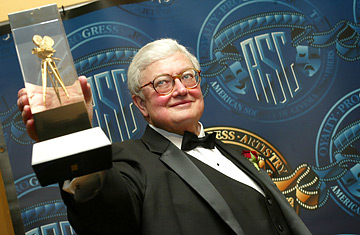
Film Critic Roger Ebert
(3 of 5)
ROGER AND ME
Movie reviewing is the solitary evaluation of a communal medium. Critics watch films in small screening rooms, or alone on DVD players, then retire in solitude to write up their opinions and insights, to recollect passion in tranquility. Roger does all that; but more than any critic I know, he brings the informed discussion of film out from under the lamp, into daylight. He has used his fame to elevate the conversation, challenging audiences to attend not just to the dramatic and ethical aspects of films but to their visual strategies. (Roger is one of the few film critics who actually, and knowledgeably, looks at movies.) And unlike a lot of people in the public eye, he's amazingly comfortable with his celebrity. I've never seen Roger rush past a fan who tugged his sleeve and asked about a movie. He actually listens to people.
That comes from his voracious interest in the world of ideas. If he had read only his own stuff he'd be one of the best-read people I know. But he's as insatiable a reader as he is a writer. The time he's spent watching movies, and thinking and writing about them, is only a sensible portion of his sentient life. He seems to have consumed every English-language novel written in the 19th century, and many from the centuries before and after. And somehow he retains it all. He has a memory that's both photographic (enabling him to recall virtually every shot from every film he's seen) and phonographic. On one indelible occasion at the 2002 Floating Film Festival, he and cinematographer Haskell Wexler sang Woody Guthrie's "The Union Maid" — and Roger performed not just the chorus ("Oh, you can't scare me, I'm sticking to the union, / I'm sticking to the union 'til the day I die") but every verse. Roger had picked it off a Pete Seeger record he heard when he was younger and repeated it decades later, word-perfect.
I go back with Roger to the early 70s, when he wrote a long, fine piece on Russ Meyer for Film Comment, the magazine I edited. He also did an important analysis of the action-film audience's disconnect from narrative — how they would simply ride from one sensational episode to another, without caring about any continuity of narrative or character. When the magazine needed a smart story, Roger would write one. By now TV had made him a star, but he was never a prima donna.
Mary and I really got to know Roger at the Cannes Film Festival in 1979, when he got us onto the yacht of Lew Grade, the Lord (literally; he'd been knighted) of ITV, and brought us into star-studded cocktail hours at Cannes' posh Majestic Bar; in one conversation about Francis Ford Coppola's Apocalypse Now, the smartest comments were made by actor James Woods. ("MIT grad," Roger whispered knowingly.) In between the partying, he managed to keep sending pieces, mostly interviews, back to the Sun-Times. That Cannes, he said, he saw seven movies and wrote 11 columns. And naturally he wrote a book about Cannes, Two Weeks in the Midday Sun, with drawings by... Roger Ebert. Uh-huh, he's also an illustrator.
It was in Cannes that I noticed how Roger looks everywhere, beyond the screen, for signs of outrageous vitality. He loves characters who are larger than life, larger even than movie life. One such was Billy "Silver Dollar" Baxter, the Broadway producer who carried a sachel of dollars coins with him and would summon waiters at the Majestic Bar in Cannes with a shouted "Irving!" Another was, is, Dusty Cohl, the cowboy-hatted Canadian lawyer who helped found the Toronto Film Festival. Roger became close friends of Dusty and his wife Joan; and when they launched the Floating Film Festival (nonstop movies and movie talk on a cruise ship), Roger eagerly signed on as a presenter. Mary and I came along for the ride, and the Festival has now sailed 10 times. The Corlisses and the Ebert-Hammelsmiths have made every one.
